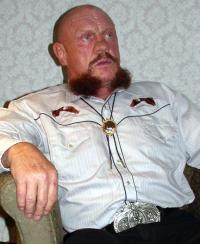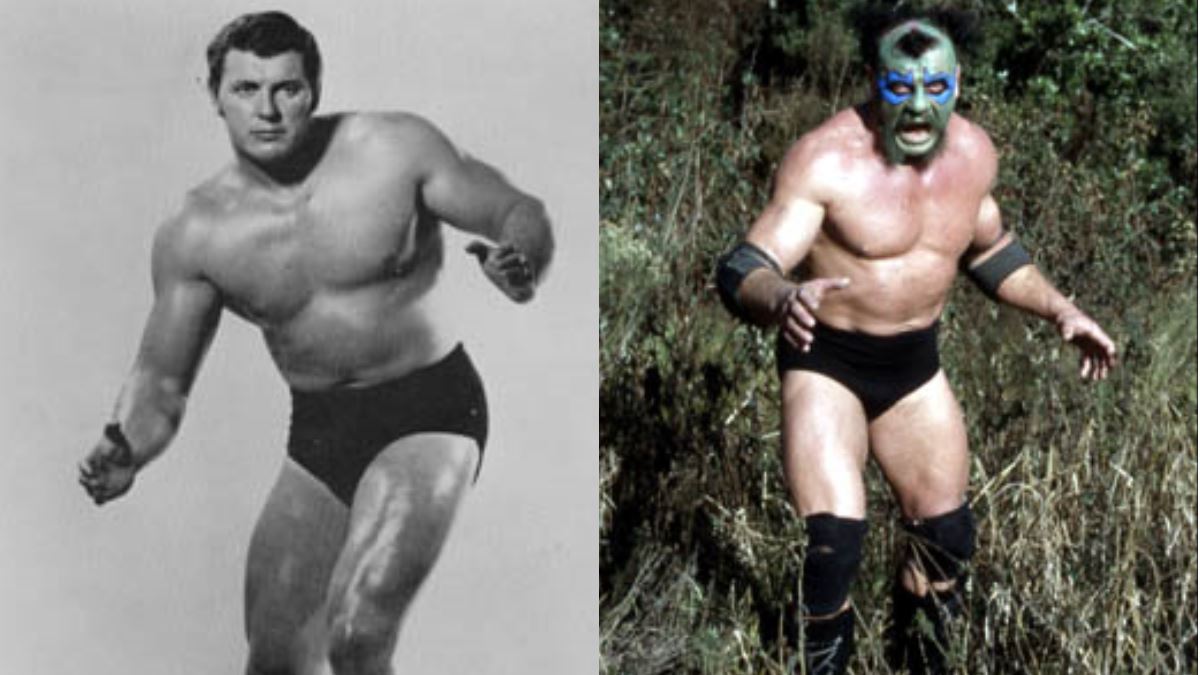Of all the wrestlers over the last 20 years, The Missing Link would not be one of the obvious choices for someone who would open up and talk openly about his career.
Yet, there’s The Missing Link breaking his silence, reverting back to his natural state as Hamilton’s Dewey Robertson in a new DVD-R from Highspots. Plus, he has a book on his 40 years in the business in the works as well.

Dewey Robertson during his shoot interview.
“The Highspots DVD is not really anything new for me at this time in my life,” Robertson told SLAM! Wrestling, explaining that he’s been working on the book for three years.
The DVD was filmed in New Jersey at the beginning of December, after the Fan Slam wrestling festival. It’s three hours long, and includes some footage of The Link in action.
“I didn’t realize until later that the people that are going to be looking at this actually believed that The Missing Link didn’t talk, so that’s exciting for the wrestling fans,” Robertson said.
Robertson’s entire career is detailed, from growing up in the wrestling factory of Hamilton, to his early days as a jobber in Pittsburgh under Bruno Sammartino, to his days as Dewey Robertson from Toronto to Texas, including his time under a mask as The Crusader. Part of Robertson’s appeal, of course, was his abrupt, mid-career change into the mysterious Missing Link. He talks about how that came about, and his time in World Class, the UWF and his brief stint in the WWF. From there, Robertson describes how his life fell apart, talking openly about his drug and alcohol abuse.
“I think the Dewey shoot interview was more personal than most of the other interviews we’ve done,” said Michael Bochicchio, the owner of Highspots. “A lot of guys are happy to do these interviews because they are getting paid and look at it as just another booking, but Dewey definitely had something he wanted to get off his chest and gave a story from his heart.”
Robertson found it easy to open up on camera. “I’ve opened up to other people in the book, but never really done it in front of an audience, and this was an audience that I can open up and recall a lot of things,” he said. “It was like jogging my memory just keeping up with the interview, not being prepared for anything.”
“The most unique part of this interview was when Dewey decided the interview was over, he told us and left the room… interview over!” laughed Bochicchio. “You could see during the interview, especially right before the interview concluded, how emotionally draining it was for him to share his story.”
Highspots has done many shoot interviews in the past, in both VHS and DVD format, including Ole Anderson, Crash Holly, Magnum T.A. Shoot Interview DVD-R, Roddy Piper, Jim Cornette, Wahoo McDaniel and Vampiro. According to Bochicchio, shoot interviews are done to bring the fans closer to the personalities. “I think with the average fan wanting to know more about the business, it naturally follows to do these types of interviews. I also think that a shoot interview is a nice tribute to a lot of these wrestlers that entertained us, as we always try to stay positive and highlight their contributions to wrestling.
“I think the biggest misconception is that everybody they see on TV is doing well and have a good life after they leave wrestling,” he continued. “However, for every positive story, there is a painful one. Many of these performers who entertained us for years struggle after their run is over. The excessive traveling takes a toll on their relationships with their families and the physical nature of wrestling leaves an extensive mark on their bodies.”
DEWEY ROBERTSON & FAMILY STORIES
- Nov. 19, 2024: Sheena, the Missing Link’s valet — and wife — dies
- Dec. 2, 2007: Stranglehold show in memory of Dewey Robertson fun and bizarre
- Aug. 19, 2007: Friends recall the many Dewey Robertsons
- Aug. 16, 2007: Cancer claims Dewey “Missing Link” Robertson
- Aug. 11, 2007: Guest column: Author reflects on Dewey Robertson’s many struggles
- Sep. 13, 2006: Missing Link book delves deep
- Feb. 11, 2004: Sterling jumps into Link with past
